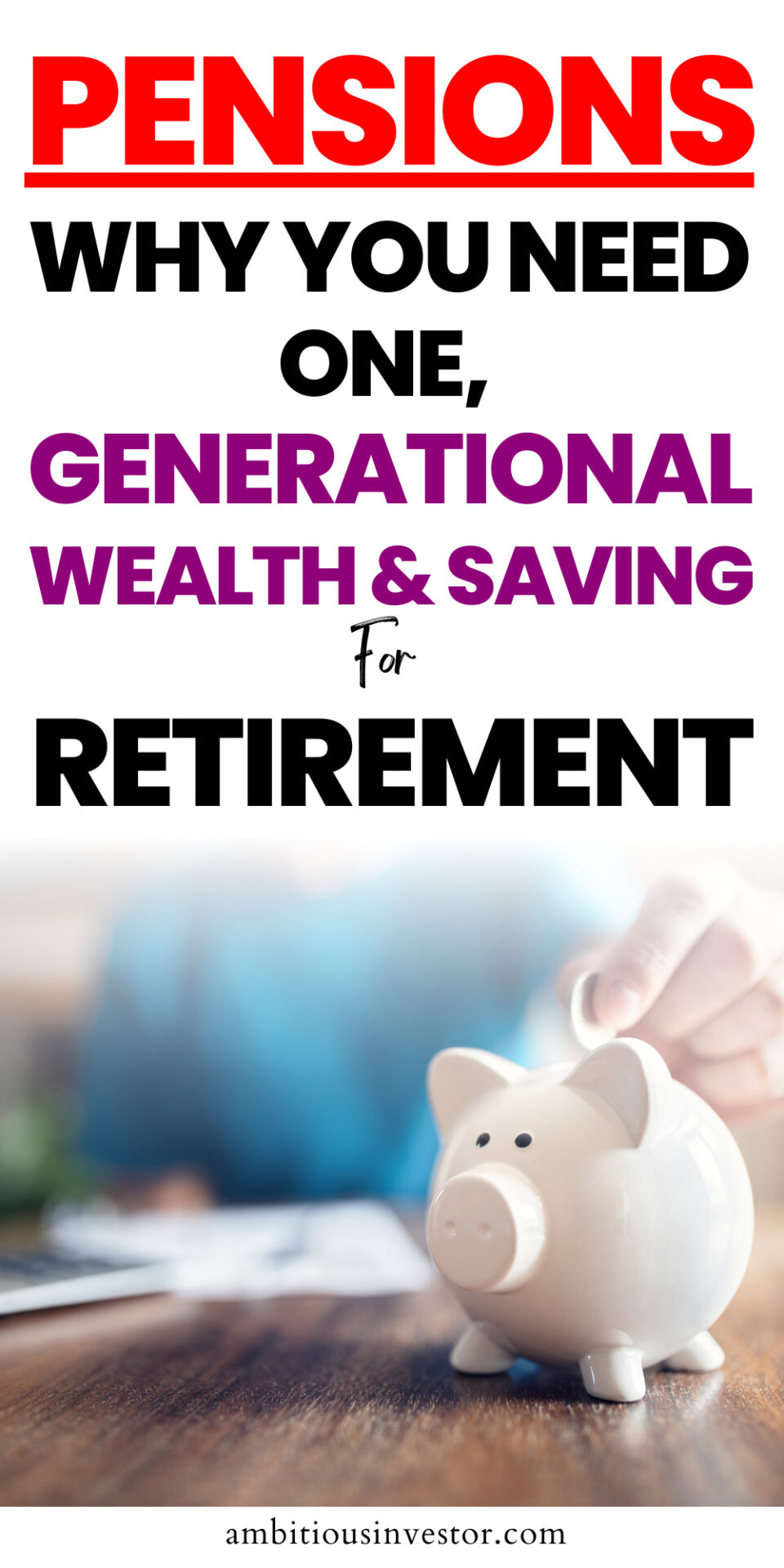Pensions- Why You Need One, Generational Wealth & Saving For Retirement
What would pensioners do differently if given a chance? Aviva surveyed them to find out. 49% of the surveyed retirees said they regretted not saving for their pension early on, and 64% wished they had contributed more to their retirement savings sooner.
The survey participants gave various reasons for not contributing to their retirement savings early. For instance, not feeling financially stable enough to save and prioritising other aspects, such as raising children, paying off mortgages, and paying for leisure activities. Most young people face similar challenges today. How do you begin saving for retirement when you can barely make ends meet on 100% of your earnings? Your mind can easily trick you into thinking that you’ll always have more time to catch up. After all, retirement can feel like a million miles away when you’re young. However, if not careful when confronted with such dilemmas, it’s possible to fall into the same financial pitfalls and regret when it’s too late.
Lucky for you, you came across this investing in pensions for dummies guide at the right time. It’s a quick and easy introduction to pensions for beginners that will give you all the information you need to start saving for retirement. So, let’s get started!
What Are Pensions?
A pension is a type of retirement savings plan. Pensions allow you to save during your working days and then draw an income from the fund when the employment paychecks cease in retirement. The money you save in a pension plan is invested in different vehicles like stocks to multiply it over time. When approached correctly, your pension savings should allow you to live comfortably during your golden years without the need to keep working part-time. We have three main types of pensions in the UK.
- State pension
- Workplace pension
- Personal pension
Each type of pension has its own set of features, rules and benefits. Understanding how the different types of pensions work can help you reap their incredible benefits.
State Pension
The State pension is a regular income the government provides to eligible individuals once they reach the State Pension age, which is not the same as the retirement age. The State Pension age is the minimum age at which you can claim your State Pension, depending on your birth year. The State Pension age for anyone born after 5 April 1960 will be 68 by 2039.
How does the State Pension work? The income benefits pensioners receive as State Pension comes from a large government pot that workers pay into during their working years through National Insurance contributions. In a nutshell, the amount you’re entitled to depend on your National Insurance record. You need at least ten years of national Insurance contributions or credits to claim any State Pension. The full benefits of a State Pension are currently £185.15 per week. You must have at least 35 years of National Insurance contributions to receive the full State Pension amount. Avoid gaps in your National Insurance record to protect your benefits.
You can already tell that you can’t live comfortably in retirement on the State Pension alone. It’s an essential source of income for most Brit pensioners, but only as a supplement to their workplace and personal pensions.
Workplace Pensions
Employers arrange workplace pensions to help you save for retirement. Your employer deducts your contributions to the pension scheme directly from your wages. Your employer can also contribute to your pension, increasing your retirement savings.
The law requires some employers to offer a workplace pension scheme and automatically enrol all eligible employees. These workplace pensions aren’t created equal. You’ll typically come across either of these two workplace pension schemes:
- Defined benefit pensions
- Defined contribution pensions
Defined benefit schemes, also known as final salary pensions, guarantee a fixed retirement income based on your salary and the duration of your scheme membership. During your working years, you’ll pay a set percentage of your salary to the scheme, with your employer matching the rest. Unfortunately, these pension schemes are becoming increasingly rare in the private sector.
Defined contribution pensions or money purchase schemes do not offer a guaranteed retirement income. Instead, your pension is determined by the amount you contribute to the plan and the performance of your investments. Your contributions to the scheme are deducted automatically from your paychecks, and your employer may also contribute regularly.
What happens to my workplace pension if I leave my job? The average employee tenure rate in the UK is 5.36 years, so there’s a likelihood that you may change jobs during your career. It’s good to seek professional financial advice before deciding how to handle your current workplace pension if you leave a job. But below are the few options often available.
- Leave your pension untouched, let it grow, and get paid when you retire.
- Transfer your funds to another workplace pension for easier management.
- Transfer to a personal pension scheme
Personal Pension Plans
A personal pension plan is one that you set up yourself. These plans are typically defined contribution plans. The funds you contribute to your personal pension are invested in various securities, such as stocks and bonds. This means that the amount you’ll receive from the plan is determined by how much you put in and how much it grows over time.
So how do you open a pension pot as a self-employed entrepreneur? You’ll need to find a reputable personal pension provider, learn about their pension schemes, and organise your contributions. Insurance companies are the main providers of personal pension schemes, meaning hundreds of personal pensions are available on the market. Choosing the best one necessitates shopping around, comparing offers, determining your comfortable contribution rate, and checking for hidden charges.
Benefits of Pensions. Why You Should Have One
There’s no doubt that pensions offer an excellent way to build up a pot of money to live on in retirement. One of the advantages of contributing to a pension scheme is tax relief. You fund your pension plan with pre-tax money. As a result, any income tax that would have been paid on the amount goes to your pension rather than the government.
The growth of the funds in your pension plan is not taxed. This means your money grows tax-free, potentially leading to a larger pot than if you paid income and capital taxes on your investments yearly. When compound interest is considered, tax-free investments pay off handsomely in the long-run.
You also may get extra free money from your employer if they contribute to your pension. The tax relief and employer contributions are free money that should not be passed up. Simply put, extra free money helps you build a larger pot at no additional cost for a more comfortable retirement.
But pensions are not completely tax-free. You’ll pay income tax when withdrawing your pension funds during retirement. However, you have the chance to take a tax-free lump sum (usually up to a quarter (25%)) first, which can also save you some tax.
How Much Do You Need Saved for Retirement?
The amount you’ll want to save for retirement is personal but depends on a number of factors, including:
- When you want to start receiving retirement income
- Your desired retirement lifestyle
- Other income sources you may have during retirement
Don’t save blindly in the hope of having a large enough pension pot by the time you retire. Instead, crunch the numbers and work towards a goal. Here are some things to think about.
- Your monthly contribution amount
- Number of years to retirement
- Increased life expectancy
- Current performance of your pension investments
- Impact of any pension charges, especially with personal pension schemes
Setting Up Pension Pots for Your Kids
Starting a pension plan for your children may seem strange, but this is where building generational wealth starts. The earlier you begin contributing to your children’s pension, the more time the money has to grow. Compound interest is the world’s eighth wonder, and its most valuable resource is time. The best part is that you can start saving for your child’s retirement as soon as they are born.
A pension plan for kids is also called a junior SIPP. They work the same way as adult pension accounts in that the money is invested in different vehicles like stocks and grows tax-free. However, the cap for tax relief on junior SIPP is quite lower and currently sits at £3,600.
Here are a few things you should know about junior SIPP:
- You must be a parent or the legal guardian to set up a junior SIPP
- Anyone can contribute to the pension, for instance, grandparents
- You manage the pension until the child turns 18. From here, they can make their pension contribution decisions
- The funds remain locked until the kids reach the retirement age
To set up a kid’s pension plan, you need to shop around and find the best junior SIPP providers. So, if you have the means, give your children the head start you wish you had for your retirement. It will significantly affect their retirement planning process and comprehension of personal finance.
Conclusion
From this blog we can see for many people, paying into a pension will do more good than harm for your personal finances. For most, a pension nest egg combined with other assets that produce cash flow will ensure your retirement is more fulfilling. There are numerous benefits from contributions from your employer, tax relief for those that are Directors of Limited companies and the list goes on. Consistently investing in your pension will ensure your money accumulates and grow. Take a look at our Blog on our review on pensions in the Retirement category.








